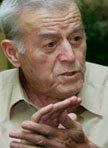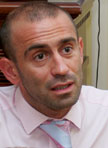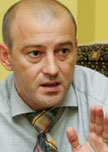|

Winter 2005 (13.4)
Pages
12-13
Mustafayev
Our Own Voices, Our Own Minds:
Stalin Crushes Would-Be Student Activists
by Fuad
Mustafayev, brother of Chingiz, and nephews - Vahid Mustafayev,
Seyfulla Mustafayev
Stalin had little tolerance
for youth movements against his regime. Perhaps, he recalled
his youth and how active he had been in organizing strikes, especially
among the Baku oil workers in the early 1900s. In 1942, eight
university students formed a group, which to our knowledge didn't
even have a name. They were troubled with the developments that
were taking place in their country and inspired by the activities
of Mustafa Kamal Ataturk who gained independence for Turkey.
They wanted the same independence for Azerbaijan. But it turned
out to be only a dream. In truth, the group was crushed before
they could do anything at all. All members were arrested. In
essence, they all were killed, either through execution, torture
or the hardships of exile.
Through the research of the late historian Ziya Bunyadov who
gained access to the KGB files in the late 1980s, the family
of Chingiz Mustafayev (1924-1943) was able to produce a television
documentary that uncovered much of the mystery of what happened
to these youth.
Today, it could be said that the legacy of Chingiz lives on.
His two nephews - Vahid and Seyfulla - have devoted their energy
to creating alternative voices for the news. Theirs were the
first independent television company to be established in independent
Azerbaijan, an extension of their commitment to break the news
related to the war in Nagorno-Karabakh in the early 1990s. Fifty
years earlier, Chingiz had given his life for the chance to listen
to German broadcasters on a short-wave radio to understand the
developments of the war.
Here Betty Blair, Editor of Azerbaijan International, interviewed
Fuad Mustafayev, and his sons Vahid and Seyfulla, co-founders
and co-owners who direct ANS (Azerbaijan News Service). ANS began
about 15 years ago but now operates television and radio stations
as well as produces several popular magazines.
Fuad (born 1929) was the brother of Chingiz Mustafayev (1923-1943)
who was arrested in 1942 as a member of a student group and who
died a few months later from injuries inflicted in prison from
torture. Fuad gave the name of his brother to his son-Chingiz
Mustafayev (1960-1992), who as a television cameraman, was killed
during the Nagorno-Karabakh war with Armenia while on assignment
to capture the essence of the war through his camera lens. Search
AZER.com: "Documenting the Horrors of Karabakh: Chingiz
Mustafayev in Action" in AI 7.3 (Autumn 1999).
Fuad: I was 13 years old when my brother Chingiz Mustafayev,
19, was arrested. That was in 1942. Turkey had gained its independence
back in 1923 under Ataturk, and Azerbaijani youth wanted our
country to be independent as well. Naturally, the Soviet regime
was dead set against it.
Chingiz belonged to a group of eight students who had organized
a club. One of their goals was to try to buy a short-wave radio
set. At that time the Soviet government prohibited listening
to foreign radio programs. Chingiz knew German quite well so
he and his friends wanted to learn what the Germans were saying
about the war [World War II]. They were trying to predict what
the outcome of the war would be.
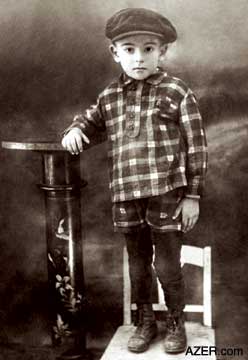  Actually,
Chingiz was really surprised when they arrested Actually,
Chingiz was really surprised when they arrested  him.
He hadn't expected it. He was taken at night - straight from
bed. They didn't even let him get dressed. Only my mother, my
brother and I were at home at the time. We didn't know where
they were taking him. My mother started crying and that woke
up the neighbors. him.
He hadn't expected it. He was taken at night - straight from
bed. They didn't even let him get dressed. Only my mother, my
brother and I were at home at the time. We didn't know where
they were taking him. My mother started crying and that woke
up the neighbors.
Left: Chingiz Mustafayev as a child. He was
arrested at age 19 in 1942 and sentenced to 10 years of labor
but died of injuries from torture before being sent to Siberia.
Photo: Courtesy the famliy of Chingiz Mustafayev.
None of the neighbors could stand up and defend Chingiz. Everybody
was scared. If, for example, somebody didn't like his neighbor,
he could turn him in. He could say something as ridiculous as
"so-and-so was criticizing Stalin's moustache". And
that was enough. They would come and take that person away in
the middle of the night.
We didn't know anything about what was happening to my brother
after he was arrested. It was like those eight young boys had
just disappeared.
We had no idea where they were being kept. Nobody knew if there
had been a trial or anything. We had no idea about what was going
on.
It turns out that another student by the name of Nasibov had
turned him in. He was a student at what is now known as the Oil
Academy and used to come to their meetings. The KGB documents
to which we later gained access, confirmed that it was Nasibov
who turned Chingiz in. We were suspicious of several people actually
- neighbors and relatives. But it was him.
Mom and I would go to the KGB building. There was a window there,
through which you could pass things for the prisoners. You were
never allowed to see them, but you could pass food and stuff
to them. Of course, you weren't even sure if they ever got what
you brought. There used to be long queues with people waiting
to pass things in. The guards would even take packages for people
who they knew had already been shot and they wouldn't say anything.
The families didn't know. They took packages from us several
times, but later on they didn't accept anything more from us.
We used to hear so many stories about how the prisoners were
tortured in the basement of the KGB building. After putting the
prisoners through grueling interrogations, they would put them
in a cell with water up to their waists. If they were to collapse
from sheer exhaustion, they risked drowning.
Those interrogation sessions were so difficult. They would take
place at night, usually starting around 11 p.m., and lasting
until morning - five or six hours later. Chingiz insisted that
his group had done nothing. They had simply organized a club,
but had achieved nothing. They just wanted Azerbaijan to be independent.
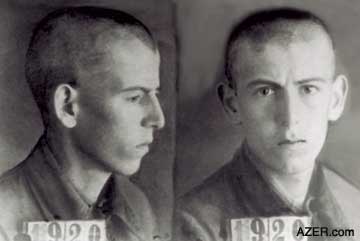  When
the Soviet Union began to collapse in the early 1990s, historian
Ziya Bunyadov gained access to the KGB archives and started delving
into the files related to Stalin's purges. When
the Soviet Union began to collapse in the early 1990s, historian
Ziya Bunyadov gained access to the KGB archives and started delving
into the files related to Stalin's purges.
Left: Chingiz Mustafayev in 1942 as Prisoner
No. 1920.
Up until then, nobody had ever done that. Bunyadov researched
this group and discovered that Chingiz had resisted until the
15th session of interrogations. That's when they brought in the
other seven members and they told him: "Chingiz, we've confessed."
Chingiz replied: "Confessed to what? There's nothing to
confess. We haven't done anything."
Chingiz' friends had been tortured so much that after the second
or third session, they had admitted to crimes that they had not
even committed. So, when Chingiz realized they had given in,
he gave up resisting as well. Even Bunyadov, who had read the
details of so many interrogations and trials, was amazed that
Chingiz could hold out so long - especially when they were torturing
him.
At the trial, three of the youth were sentenced to be executed
[December 24, 1942]. The remaining five were sentenced to 10
years of hard labor.
  At about
that time in 1943, a decree was made so that prisoners, who were
deemed too ill to be treated, could be released. At about
that time in 1943, a decree was made so that prisoners, who were
deemed too ill to be treated, could be released.
Left:
Fuad Mustafayev, younger
brother of Chingiz who was repressed. Here Fuad is with his sons,
Vahid and Seyfulla, who together run ANS (Azerbaijan News Service)
Group.
In other words, if it was inevitable
that the prisoner was going to die, they let him return home
so that more space could be made available more quickly in the
prisons. That's why Chingiz was released early. They let him
come home because he had been so badly injured from abuse and
tortures. Many years later, we discovered a photo in the KGB
archives where you can see that they had tried to powder his
head so that the bruises would not be so visible in the photo.
Seyfulla: It was wartime. A very difficult period. There
were so many Soviet soldiers who had been imprisoned by the Germans.
So upon their return to the Soviet Union, Stalin, did not release
them. He sent the soldiers to labor camps. That's why there wasn't
enough space in the prisons and camps; therefore, he made a decree
to release all the others who were sick and dying, along with
the elderly.
Vahid: These guys didn't bomb anything. They weren't
terrorists. When my Uncle Chingiz said they hadn't done anything,
he meant that they had just formed a group. It was natural for
them to create a little group since the Constitution of the Soviet
Union declared that their country was a democratic country, and
everybody could say whatever they wanted to. That's why Chingiz
had insisted that they hadn't done anything.
Seyfulla: In fact, human rights were protected in the
1937 Constitution of the Soviet Union. So, Chingiz thought it
was his right to organize a club. Such things reveal the hypocrisy
of the Communist regime. It looked like one thing on paper but,
in reality, it was really a totalitarian regime against the people.
Vahid: These youth didn't know what they had done wrong
because they had not committed any crime. They had not carried
out any act of terror. Simply, they had formed a small group
of close friends who were interested in political issues. They
didn't agree with the state policy and they wanted Azerbaijan
to be independent. According to the 1937 Constitution, every
republic in the Soviet Union was independent. But these youth
were in quest of real independence.
Seyfulla: It was called the Union of Independent
Republics.
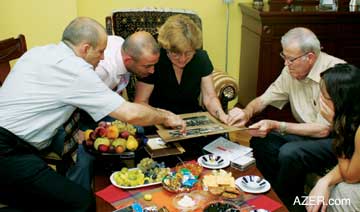  Vahid:
But, in reality, it wasn't like this at all. Vahid:
But, in reality, it wasn't like this at all.
Left: At the interview in August 2005 in
the Mustafayev Home: (left to right) Seyfulla, Vahid, AI Editor
Betty Blair, Fuad Mustafayev, and Gulnar Aydamirova, AI Editorial
Assistant.
Seyfulla:
Formally, every  republic
in the Soviet Union had its constitution, its own flag, its own
national anthem and emblem. But all these things were just another
guise for the Russian empire. So many people had already been
repressed during those horrible years - particularly 1937 and
1938 - because the Soviet Union was cut off from the rest of
the world. The international community didn't know what was going
on. The Soviet Union was a closed society - like a big prison. republic
in the Soviet Union had its constitution, its own flag, its own
national anthem and emblem. But all these things were just another
guise for the Russian empire. So many people had already been
repressed during those horrible years - particularly 1937 and
1938 - because the Soviet Union was cut off from the rest of
the world. The international community didn't know what was going
on. The Soviet Union was a closed society - like a big prison.
Vahid: People could not understand what was happening.
Radio, TV and government officials said one thing, but the State
operated in exactly the opposite manner. They said you were free,
that you had freedom and could do what you wanted. But they would
watch everything you did. And if you did anything against their
policies or ideology, they would arrest you.
Seyfulla: The authorities would compile a list
of names and charge these people with being "Enemies of
People". I'm a historian. I know how the system worked.
People would attend meetings at work or on the streets, and they
would agree to the annihilation of the "Enemies of the People".
All the people - we ourselves - not somebody from another planet,
just ordinary local citizens - were involved with accusing fellow
neighbors, fellow workers. This is one of the most destructive
things about totalitarian regimes: it pits people, one against
the other. It's so difficult for us to comprehend such things
now, but they were commonplace back then. People were used to
the fact that almost every night someone would disappear.
Everybody was absolutely afraid and that's why nobody would speak
out against anything. They were afraid that they, too, would
be taken away some night. When I was growing up in the 1960s,
I remember my parents trying to find a way to make us behave.
Father used to try to scare us by saying: "A big black car
will come and take you away." It wasn't until I had grown
up that I understood what that meant. I didn't know what black
cars were all about. I later learned that people referred to
these cars as "Black Ravens". Everybody was so afraid
of them. They would pull up in front of a house or apartment
in the wee hours of the morning and agents would arrest the occupants
inside. The black cars were used to haul people back to the KGB
prisons.
Fuad: This all started happening around 1937. For example,
we had a neighbor whose husband had been arrested and later was
shot. He had been a commander-in-chief of an army division or
something like that. Later the wives of such people were also
arrested so that they wouldn't speak out. They were sent to exile,
often to Central Asia or Siberia. Many of them died during transit
because of the inhumane conditions.
This neighbor later told us how they had stopped the train in
between two stations. All the women were made to stand outside
in a line. Two officials started calling out the names and reading
the sentences. Just there - out there in the middle of nowhere.
No trial, nothing. They sentenced this woman to eight years in
exile and she just turned and said: "Thank you". If
she had objected, she would have had more trouble. She spent
five years in exile in Siberia before she was finally freed.
The primary goal of Stalinism was to create "a new man".
They were looking for people who would blindly follow the rules
of the Communist party and who wouldn't think for themselves.
People like Chingiz and his friends were perceived as enemies
because they weren't among these "new men". People
like Mammad Amin Rasulzade, Fatali Khan Khoyski or Nariman Narimanov
also wanted an independent Azerbaijan but they were deceived.
Narimanov was called to Moscow and then was mysteriously murdered.
That just goes to show that from the beginning, the Soviet Union
was really an empire; there wasn't any democracy here.
Chingiz was very smart. He would spend his summer vacations studying
mathematical problems. He was especially strong in math and was
intrigued with anything that had to do with electricity. Those
eight young fellows used to gather in our courtyard. They used
to do all sorts of physical exercises together. They would practice
weight lifting with heavy rocks. They were all strong guys. My
father wasn't at home when Chingiz was arrested. He was at our
uncle's place.
Father was sick and the doctor recommended that he get some fresh
air. The air was good for him there down near the sea at his
brother's place. For several months, we succeeded in hiding the
fact from him that Chingiz had been arrested and taken away.
Then someone, who wasn't a family member or close friend, broke
the news to him, and father had a heart attack and died.
Father had suffered so much when the Bolsheviks came into power
and that's why he was always thinking about it. It had affected
his heart. Bolsheviks took away almost everything he owned.
Before the Revolution [1920], my father had been a successful
merchant in Baku. He had a factory that produced leather, wool
and carpets, which he sold to Turkey, Central Asian and other
countries. When the Soviets came, they confiscated everything
and sent him to prison in Gusar where they kept him for about
a year and a half. He was repressed simply because of his wealth.
We lived on Polukhin Street near School No. 5 - on the way from
Baksoviet Metro station up towards the Narimanov statue. The
entire building used to belong to my father. Then the Bolsheviks
divided it up among several families and left our family with
only one room. Originally, the house had had six rooms.
I served in the Soviet Army for 15 years. Upon graduating from
the military academy in Leningrad, I was sent to Kapustingrad
where I was the head of one of the departments where the Soviet
rockets were being tested. Had officials known my background
- since my brother had been killed as an "Enemy of the People"
and my father had been imprisoned by the Bolsheviks, they would
never have let me work there as it was a state entity. But they
didn't know. I simply never mentioned those things in my CV.
I simply wrote that both my father and my brother had died in
the war, not that both of them had been repressed.
  Left: Fifth Graduating Class from International School
No. 1 in the Chaparidze District of Baku (1939-1940). Chingiz
Mustafayev and classmates who joined together to try to help
Azerbaijan become an independent nation: (1) Suleyman Isgandarli,
(2) Zaman Mehdiyev, (3) Huseinagha Aghayev, (4) Alasgar Taghiyev
and (5) Chingiz Mustafayev. There were three other youth arrested.
All of them were killed or died in exile. Photo: Courtesy the
family of Chingiz Mustafayev. Left: Fifth Graduating Class from International School
No. 1 in the Chaparidze District of Baku (1939-1940). Chingiz
Mustafayev and classmates who joined together to try to help
Azerbaijan become an independent nation: (1) Suleyman Isgandarli,
(2) Zaman Mehdiyev, (3) Huseinagha Aghayev, (4) Alasgar Taghiyev
and (5) Chingiz Mustafayev. There were three other youth arrested.
All of them were killed or died in exile. Photo: Courtesy the
family of Chingiz Mustafayev.
Vahid: Grandfather probably
could have fled the country. Many people did leave for Turkey
and Europe. But every generation in our family has said that
this is where our parents died, and we have always refused to
give up our land.
Every generation has said: my grandfather did this, my father
did this, and now we say the same thing.
We have seen difficult times here as well and it's not very easy
now either. We have a lot of friends abroad. But we stay here.
We'll die here.
Seyfulla: This is my country - mine personally.
Not the government's, not the opposition's. It's mine.
Vahid: Our family has the tradition of fighting and dying
for this land. We know how to fight and we know how to die. That's
very important.
Seyfulla: It wasn't until 1961 that the government
sent us a letter saying that Chingiz was not guilty and that
they were "rehabilitating" him. But the truth is: he
really was guilty in front of the regime. He fought for independence
against them.
Vahid: He wasn't guilty in front of his own people, but
he was guilty in front of the Soviet government.
Fuad: Look at this photo. Do you see that five of those
young boys from that group studied together at school? They were
from the same class. There was one girl who was a member of their
group as well but none of the boys exposed and named her. Ziya
Bunyadov researched their story in memory of this woman, whose
name was Nasiba.
After ANS made a TV documentary based on Bunyadov's research
that featured Chingiz and this group, the brother of Agha came
to see me at my office. He was very grateful that the truth about
those young boys was being made known and that people could learn
about these youth. His brother had been sent into exile at Kolyma
[in Eastern Siberia] for 10 years. But after he completed that
sentence, they made up some sort of excuse and gave him another
five-year sentence so that he wouldn't be able return to Baku
and talk about the things that had happened to him.
He only returned after Khrushchev came to power. He had no teeth
left. The next day after his arrival, he was told he had to leave
Baku and that he wouldn't be allowed to live in the capital.
So, they left for Ali Bayramli where they had relatives and that's
where he died. He didn't even manage to live for five or six
months after his return.
We didn't know what Chingiz was being accused of when they took
him. Nor did we know what went on during his trials after the
KGB arrested him. Only after Chingiz was released and we brought
him home did he tell us a little bit about it.
He was arrested in July 1942 and released in May 1943. Some of
his friends came to visit him the night that he was released,
but he told them not to come again as he was afraid that they
could get into trouble because of him. They were just friends
- not members of any group. But Chingiz was concerned about their
safety if they came to visit him.
|
"All the people
- we ourselves - not somebody from another planet, just ordinary
local citizens - were involved with accusing fellow neighbors,
fellow workers. This is one of the most destructive things about
totalitarian regimes: it pits people, one against the other."
--Seyfulla Mustafayev,
historian and co-founder of ANS,
looking back on Stalin's purges, which took a devastating
toll on millions of lives in the Soviet Union.
|
They didn't tell us that they were releasing Chingiz. They just
released him and let him leave the prison on his own. But he
was too weak. He took a few steps, and then had to sit down because
he couldn't walk. So he went back and told them he couldn't walk.
Someone was assigned to drive him and that's how they brought
him home.
We were shocked to see him on our doorstep. We didn't know anything
about his release and that he was coming home. But Chingiz was
so ill he couldn't even sit down when he arrived here. He was
so sick. We made a bed for him so that he could lie down. He
was in such a horrible state - beaten up, with bruises all over
his body.
Chingiz was so ill that they released him to make way for other
prisoners. The next day someone from the KGB came knocking on
our door and told us that Chingiz could not remain here in Baku.
Another decree had identified more than 150 cities to which prisoners
were not allowed to return. Baku was on the list.
So, we had no choice but to take Chingiz to Goychay [a town in
the foothills of the Caucasus in north central Azerbaijan]. He
had severe brain injuries. He had been beaten up so much that
the membrane of his brain had become inflamed. When he arrived
home from prison, he was only bone and flesh. There the doctors
tried to treat him, but it was already too late. He died about
three or four months later. And so we buried Chingiz there. It
was during those few months in Goychay that Chingiz told us about
the tortures that he had suffered. They had tied him up in a
black rubber sack and thrown and kicked him around. This was
a usual practice until the prisoner would give in and sign a
paper admitting that he was an "Enemy of the People".
At the last interrogation session, they made Chingiz sign beneath
every sentence in the document. They wrote whatever they wanted
there and made him sign it. But Chingiz really didn't talk much
about what had happened to him. He only told us that he had been
beaten up. He didn't say much more. He mostly remained silent.
Those were difficult times. It's difficult for us to understand
it now. Even those who already suffered so much, just didn't
say anything. They were so broken and so scared.
You know, when we were growing up, we never told anyone that
Chingiz had been in prison and later released. We never said
anything. If someone asked what happened to Chingiz, we just
said that he died in the war. Of course, people close to our
family - our close relatives and neighbors - knew the truth.
And I didn't tell my children anything either.
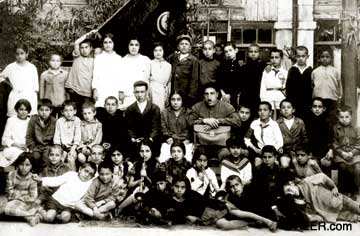  Seyfulla:
Let me give another Seyfulla:
Let me give another  example
about how afraid people were. example
about how afraid people were.
Left: Young Chingiz Mustafayev is seated
on the bench on the second row, third from the left. He was eight
years old, 1931. Photo: Courtesy the family of Chingiz Mustafayev.
When the Armenians were
killing so many people in Baku in March 1918, my grandmother
was only 13 years old. She remembered all those things. She was
old enough to understand what was going on. Once I was coming
home from school with an Armenian child.
When I got home, grandmother told me not to make friends with
Armenians. I objected saying we were international and that she
was old-fashioned.
She told me not to be friends with them, but she didn't say anything
else. I asked her why but she wouldn't tell me anything else.
I mean the fear was so deep within her that she didn't even tell
her own grandchildren who she considered the enemy to be.
She had witnessed all that violence that the Armenians had carried
out in the 1918 massacre in Baku, but yet she wouldn't tell us
anything. In the case of my own brother [whose name also was
Chingiz], he found out about our Uncle Chingiz for the first
time in 1989 when Ziya Bunyadov published an article about it.
He got hold of the newspaper and walked home reading that article.
Of course, Chingiz knew that his uncle had been repressed, but
nobody talked much about it. Nobody talked about the details.
|
"This is my country
- mine personally.
Not the government's, not the opposition's. But mine."
--Seyfulla Mustafayev,
speaking about the responsibility that he and his family feel
towards protecting the independence of Azerbaijan. Seyfulla's
uncle was killed by Stalin's regime in 1942 because he wanted
Azerbaijan to be independent.
|
Vahid: I knew about him from childhood because I had
found Chingiz' rehabilitation papers in a drawer.
Seyfulla: We already had the makings of "the
new person" that Stalin wanted to create. I remember that
during my first year of study at the University of Leningrad,
I prepared a paper about how Solzhenitsyn was the "Enemy
of the People". Up until that time, I had not even read
a single line from Solzhenitsyn. We had all been Pioneers and
Komsomols. We didn't really know what he was saying.
Vahid: It was very difficult to carry out the research
that Ziya Bunyadov did. Even today the KGB still doesn't allow
access to some of those documents. Ziya Bunyadov was very famous
and very powerful. We at ANS went there to make a documentary
because we had the power to do that as well. But other people
- ordinary Azeris - don't have access to the KGB archives. Nobody
will listen to them. That's the problem. No information. I think
it would be very valuable for the government to release those
documents, for sake of ideology.
Seyfulla: If we had had such information, we
could have started our fight for independence earlier [than the
late 1980s].
Vahid: Here in Azerbaijan during every period under Soviet
power, we had our dissidents, we had our people who died for
their ideas, for their quest for independence. I think this shows
the power of our nation, of our people. Because our people are
very independent and they want to be independent.
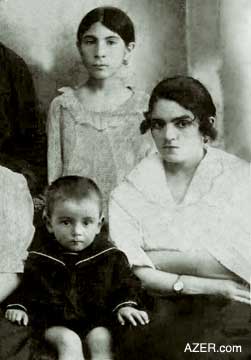  Fuad:
You ask if it's important that these stories be told. Definitely,
yes. The young generation needs to know all about them. These
are facts. This is truth. It's part of our history. It's important
that people know - both within the Azerbaijani society, as well
as within the international community. Fuad:
You ask if it's important that these stories be told. Definitely,
yes. The young generation needs to know all about them. These
are facts. This is truth. It's part of our history. It's important
that people know - both within the Azerbaijani society, as well
as within the international community.
Left: Chingiz with his mother. 1926. Photo:
Courtesy the family of Chingiz Mustafayev.
In addition to Chingiz who died from injuries inflicted while
he was tortured, and the three boys who were shot, the other
four friends who were sent to labor camps all died there. So,
essentially, none of the members of this group survived. They
all were barely 20-21 years old when they were arrested.
I think it's important to name those people who spied and turned
these youth in. Those names should not be forgotten. They should
be documented as part of history for everybody to know why these
things happened and how.
Seyfulla: I disagree. I don't think those people
who turned others in should be exposed. Those who carried out
such deeds are dead. Only their descendents live today. But that's
not the only reason they shouldn't be exposed. You see, those
people lived under such difficult circumstances and such a terrible
regime. But they are still Azerbaijanis. We should not kill each
other because of such things. Those things are from the past.
Those people were victims of circumstances.
If their names are mentioned, I don't think hatred should be
generated against their children. These people are from our nation,
they are Azerbaijanis. They were weak and could not withstand
the pressures of their circumstances.
Vahid: I disagree. Those people who contributed to the
deaths of others during Stalin's regime should be held responsible.
Those who spied on innocent people and turned them in - their
families and descendants should bear the guilt. They have blood
on their hands as well and this guilt passes down, generation
after generation, through the genes.
If Chingiz Mustafayev were alive - both of them - my uncle and
my brother, if they had lived and not been killed, they could
have done so much for our nation. But they were murdered and
the evildoers survived. You need to maintain the balance of nature.
If you kill all the good people, the evil ones will rule. That's
the problem. We have to fight against those people. We have to
choose the balance in the country now. Don't you think it would
be better for Chingiz to have lived rather than those who turned
him in? Those who spied on them? Chingiz died but Nasibov lived.
|
"Those people
who contributed to the deaths of others during Stalin's regime
should be held responsible. Those who spied on innocent people
and turned them in - their families and descendants should bear
the stain of guilt. They have blood on their hands and this guilt
passes down, generation after generation."
--Vahid Mustafayev,
President of ANS Group,
and nephew of the Chingiz Mustafayev,
who at 19, was killed by the KGB.
|
Fuad: I agree with you. They should be punished.
Vahid: Chingiz could have done so much if he had lived.
He was a genius.
Fuad: It's interesting also to know what people thought
about Stalin. How could Stalin rise and be a dmired
so much when all of this was happening? Those who suffered from
his policy condemned him in their hearts. But no one could say
anything openly because they were afraid of being arrested. As
unbelievable as it may sound, many people admired Stalin back
then, and even still do today. dmired
so much when all of this was happening? Those who suffered from
his policy condemned him in their hearts. But no one could say
anything openly because they were afraid of being arrested. As
unbelievable as it may sound, many people admired Stalin back
then, and even still do today.
  Seyfulla:
My mother cried in the classroom when Stalin died [1953]. She
thought that God has died. She was a little girl at that time. Seyfulla:
My mother cried in the classroom when Stalin died [1953]. She
thought that God has died. She was a little girl at that time.
Left: Chingiz Mustafayev, 16, in the 10th
grade (late 1930s). Chingiz is the Lower right hand corner. Photo:
Courtesy the family of Chingiz Mustafayev.
Fuad: Stalin was a bandit before he came into power.
He used to rob banks and send the money to Lenin, who would use
it to publish books and pamphlets. People didn't have much information
at that time. They only heard, "Stalin this and Stalin that;
he cares about us; thanks to Stalin for our nation." So,
it was all brainwashing and propaganda. So, it's natural, for
example, that my wife cried when Stalin died. But now, of course,
she has more information about it and now she thinks differently.
Seyfulla: Stalin was a very complicated and many-sided
person. He did a lot of things as the head of the state. For
example, my dad would say that each year the prices would go
down under his rule.
Vahid: People didn't always realize that Stalin himself
was behind all this death and destruction. They thought it was
carried out by people working under him and that he didn't know
about these crimes - the executions, repressions, tortures and
exiles. They didn't make the association between those atrocities
and Stalin. People also had great admiration for Stalin because
he had won the war [World War II].
Fuad: But, on the other hand, he also killed so many
people. Millions upon millions.
Vahid: We're working on Uncle Chingiz' grave now. We're
doing this because we want to preserve the history. People need
to know what really happened - what the truth really is. It's
impossible to build a nation if it doesn't know its history.
Gulnar Aydamirova, Azerbaijan
International Editorial Assistant also contributed significantly
in the preparation of this article.
Back to Index AI 13.4 (Winter
2005)
AI Home
| Search | Magazine
Choice
| Topics
| AI Store | Contact us
Other Web sites
created by Azerbaijan International
AZgallery.org | AZERI.org | HAJIBEYOV.com
|


